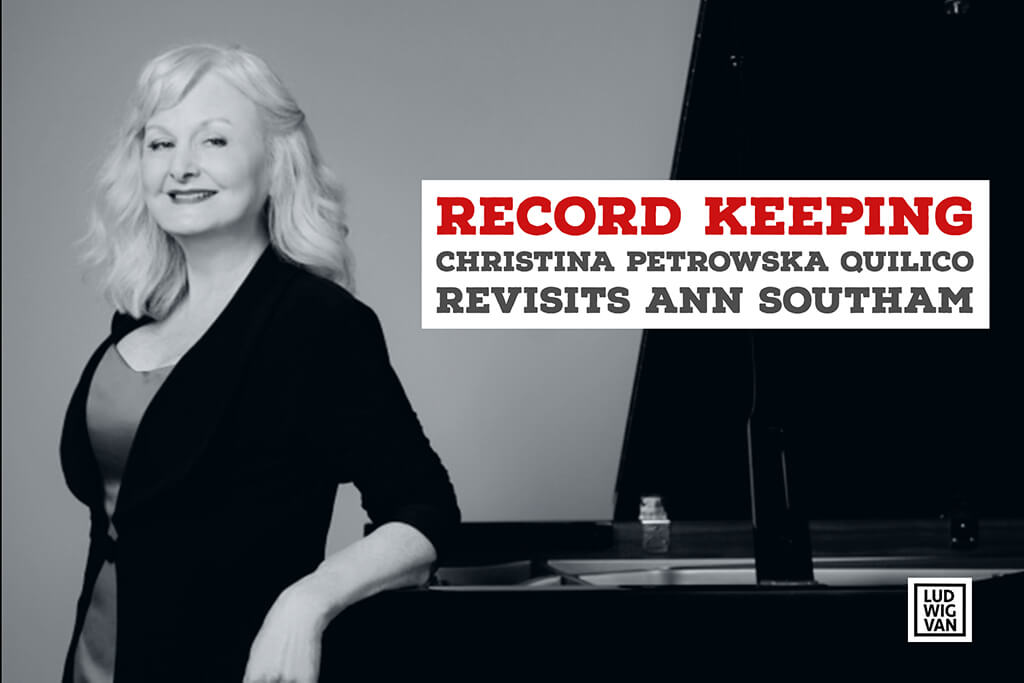
So much of Canadian art music composition sits silently on shelves, laptops and portable flash drives. The bulk of our composers’ output may never be performed more than once or twice, and the possibility of recording it is even more remote, given its sales potential and the expense of studio and recording time and expertise.
It may be small consolation that Canadian creations are in great company with the output from other countries and centuries, but if we don’t hear it, does it really exist? It is only potential music, not the real, living, streaming kind.
Kudos to people like Toronto pianist Christina Petrowska Quilico for trying to remedy this. Last month she released Soundspinning, an album devoted to the solo piano music of the late Ann Southam. It is available on the Canadian Music Centre’s Centrediscs label
Quilico and fellow Torontonian Eve Egoyan became friends of Southam’s, and both have had success with recitals and albums featuring her compositions. Quilico’s two Glass Houses albums sparkled. Egoyan’s three contributions — 5, Returnings and Simple Lines of Enquiry — were mesmerizing.
Now Quilico is back with 53 minutes of music that include nine works, of which seven have not been released on a commercial recording before. The oldest and most substantial piece on the album, Altitude Lake, dates back to 1963, when Southam would have been 26 years old.
The most recent is Where, a 1995 Christmas present to Halifax pianist Barbara Pritchard. Southam died in 2010.
Southam’s compositional style evolved considerably over the years. The earlier pieces are atonal, adapting 12-tone writing. The more recent pieces use a variety of process or pattern music forms.
Quilico is an energetic, brilliant player who puts the brightest spin on the variety of short pieces on the album. But most of them are not Southam’s best work. This album is a clear example of diminishing returns.
The album’s openers are three pieces that last a total of two-and-a-quarter minutes (Sonocycles) and eight pieces that run to seven-and-a-quarter minutes (Soundspinning, minus Southam’s original ninth movement).
Both date from 1979 and sound like miniature studies for later works like Glass Houses. Listening to them is not much different from walking past a miniature abstract in a gallery. There is well-crafted work here, but not enough of it to allow genuine appreciation.
In the same vein, the twelve movements of Slow Music, also from 1979, timeout at 10 minutes. Quilico has chosen four of these, all sounding like short sketches that Southam later elaborated to great effect in Simple Lines of Enquiry. The music comes out brittle in Quilico’s hands, undermining any possible hypnotic effect.
Where, another short piece with dreamlike potential, is rendered as a short, mechanical recitation.
3 in Blue are fun, jazzy pieces, while Cool Blue; Red Hot are the shortest of miniatures, placed by Quilico in opposite order to Southam’s original intention. (They were also recorded on a four-CD set sample of Canadian music for piano students 18 years ago.)
The big work on the program is Altitude Lake, a virtuosic, sprawling, sonata-like atonal piece that lasts 11 minutes. Its structure is fascinating, but listening to it is work rather than something to do while nursing a single-malt Scotch.
The gem, the one piece from this album that is destined for immortality, is the closing track: Remembering Schubert, which dates from 1993. Quilico’s recording of this work is its third, already giving it elite status among Canadian compositions. It is a seductive, 10-minute dream of repeated patterns embedded with Schubertian references.
Quilico’s take is, unfortunately, a bit too bright and articulated compared to Egoyan’s smooth, seductive interpretation (which you can check out on YouTube below). The third interpreter was Toronto pianist Mary Kenedi (on Palimpsest, a year-2000 recorded compilation of Canadian piano music), whose interpretation is silky yet much slower.
In short, Soundspinning makes far more sense as a historical record than something to savour. This hardly makes an enthusiastic case for recording the stacks of Canadian compositions that are still awaiting a stage or a recording mic. But at least someone tried.
For more information about Soundspinning, click here.
++++
Toronto pianist Adam Sherkin continues to explore contemporary art music for the solo piano. His late-afternoon concert season is on hiatus because of changes to the way the Glenn Gould Studio is being managed, but he is recording and offering intimate recitals at his home in Toronto’s west end (whimsically titled Piano Lunaire).
During this transition period, Sherkin has released Soliloquy, an EP consisting of five tracks: A fabulous little Prélude in F Major, written in 1956 by Montreal composer Jacques Hétu; a 1926 piece by Colin McPhee titled Invention; and three Meditations by Sherkin himself — “Midsummer Ballad,” “Soliloquy,” and “Scotch & Hapiness.”
The McPhee piece is a playful treat, while Sherkin demonstrates his prowess with tone colour and atmosphere in his own creations. He is a fine, sensitive and virtuosic pianist who deserves our encouragement.
Soliloquy has been released by Centrediscs, as well, as either a conventional CD or a vinyl album (click here for more info). You can check out “Scotch & Happiness” on Sherkin’s website, here.
- Classical Music 101: What Does A Conductor Do? - June 17, 2019
- Classical Music 101 | What Does Period Instrument Mean? - May 6, 2019
- CLASSICAL MUSIC 101 | What Does It Mean To Be In Tune? - April 23, 2019



